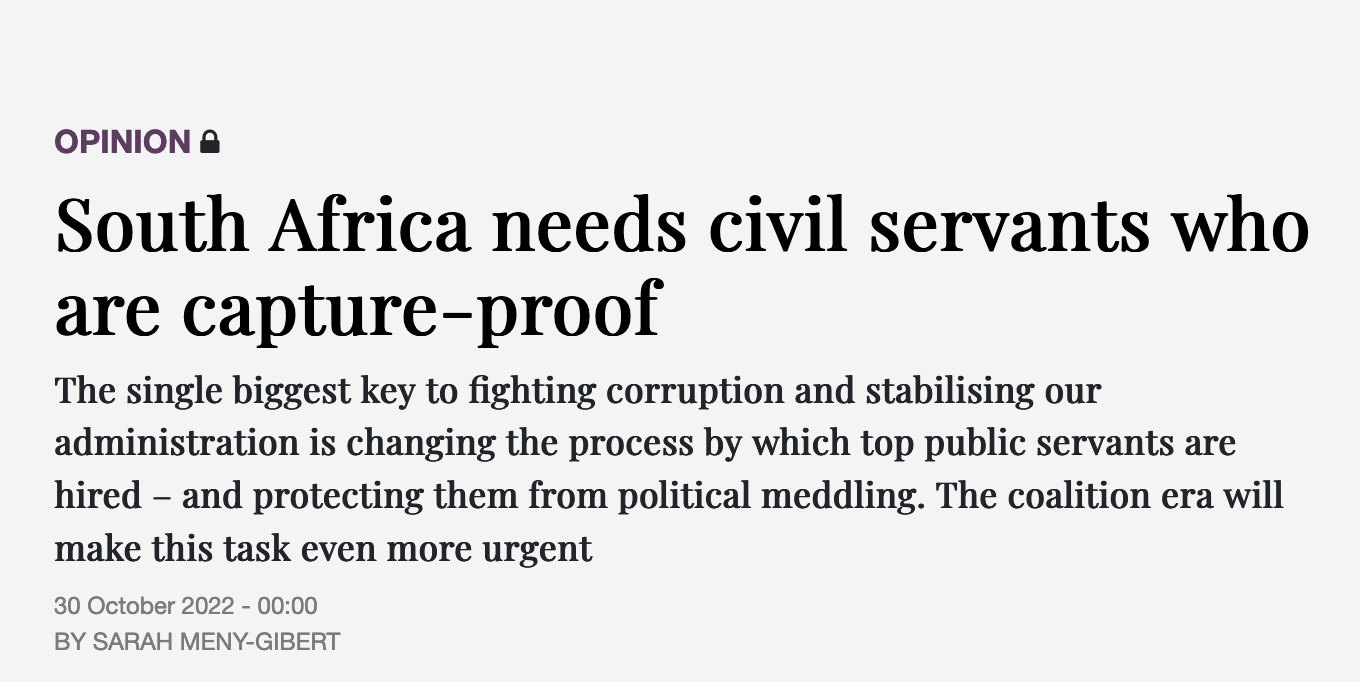By Sarah Meny-Gibert
[First published in Sunday Times]
The single biggest key to fighting corruption and stabilising our administration is to change the process by which top public servants are hired – and in doing so, protect them from political meddling. The coalition era will make this task even more urgent.
The President’s response to the Zondo Commission – released last Sunday – admits that state capture was achieved through the strategic appointment of cronies to the leadership of state-owned enterprises and departments, with a view to controlling and then abusing public procurement. There has been much focus in the public domain on the ANC’s policy of cadre deployment as the main target in need of reform, and Chief Justice Zondo, in his State Capture Commission report, criticised its current practice as compromising the equality, fairness and transparency of appointment processes.
By way of thought experiment, though, let us imagine that the ANC – in response to Zondo’s findings and the public’s outrage – does a mea culpa on cadre deployment and commits to doing away with the policy. Do we really believe it will end the practice? Don’t all political parties practice deployment? And do we not, in voting for them, hope they take charge of the state? Of course, we hope that they do so in the service of the vision on which they canvassed our support – but the line the between deployment for policy and deployment for self-interest is blurry.
Certainly, it’s clear that an ANC policy initially designed to ensure strategic control over the apartheid bureaucracy it inherited in the mid-1990s morphed early – before Zuma – into a mechanism for extracting monies and rents from the state. There’s no denying that cadre deployment as currently practiced has been a major culprit in state capture and corruption more widely – corruption that has eaten away at citizens’ trust in democracy’s ability to deliver.
A sobering statistic emerged from Afrobarometer’s 2021 survey – 45% of South Africans said they were very willing to give up regular elections if a non-elected government or leader could impose law and order and deliver houses and jobs.
My point is not to deflect attention from demands for greater accountability from our public leaders. But the “fix” for the “capture” of our state administration needs to go to the source: it lies in ensuring there is less room for politicians to plant their cronies in the service of corruption in the first place. Bolstering the laws and state processes for hiring senior public servants is a vital ingredient in “capture-proofing” the state.
Over the last fifteen years we’ve witnessed the development of a factionalised and unstable form of patronage and corruption. South Africa is not unique here – patronage in democratic states marked by poverty and inequality often takes this form. This fracturedness has caused a good deal of instability in departments, and tension in the relationship between political and administrative leaderships. This in turn has paralysed government programmes and even routine processes for service delivery.
The remedy is to protect and develop a stable rank of civil servants who are committed to the Constitution and the democratic mandate, and not to private interests. And with the coalition era now beckoning, the task of building such a spine of skilled administrators is even more urgent. Our coalition politics is immature: city-level experiments to date have been defined by the parties’ preoccupation with short-term gains. This messiness reflects the social divides in South Africa, the cut-throat nature of corruption politics, and the inherent difficulties of coalition politics.
More competitive elections could bring greater accountability, but they could also bring even more instability in the public administration – witness the recent service disruptions in Joburg as political power switches back and forth.
A set of proposals aimed at bolstering the public service was announced by the Presidency last week. It has the less-than-catchy title of the ‘National Framework Towards the Professionalisation of the Public Sector’, but it demands attention. It begins, following the National Development Plan, with a vision to “build a meritocratic and professional public sector that serves the government of the day in a loyal manner but has sufficient institutional autonomy to build and retain skills and be protected against political patronage.”
The framework proposes delinking the tenure of directors-general from electoral cycles. It proposes a role for the Public Service Commission in the selection process for senior officials, and other potential checks and balances in the appointment of top officials. But the crux, as always, is whether government will act on these noble intentions, and whether it will do so in a way that does indeed insulate appointment processes from patronage and instability. For example, the framework is vague about how to ensure that a new position of the Head of the Public Administration, with a role in the selection of top officials, (proposed some ten years back in the National Development Plan) is protected from undue political pressure.
The sensible compromises and fixes that our first set of democratic leaders developed in the mid-1990s are no longer working for us. Within the highly durable architecture of our Constitution, we need to reform the institutions regulating the interface between politics and our public administration. And we need to do it urgently.
With state capture still present, and a new era of coalition politics very likely, state reformers and civil society need to stress-test their reform ideas against both the present political landscape and the imminent future.
Sarah Meny-Gibert leads the State Reform programme at the Public Affairs Research Institute (PARI), Johannesburg.


